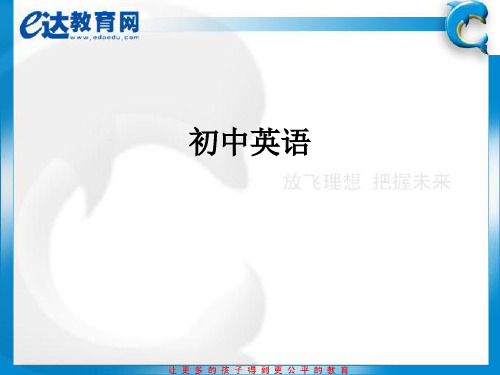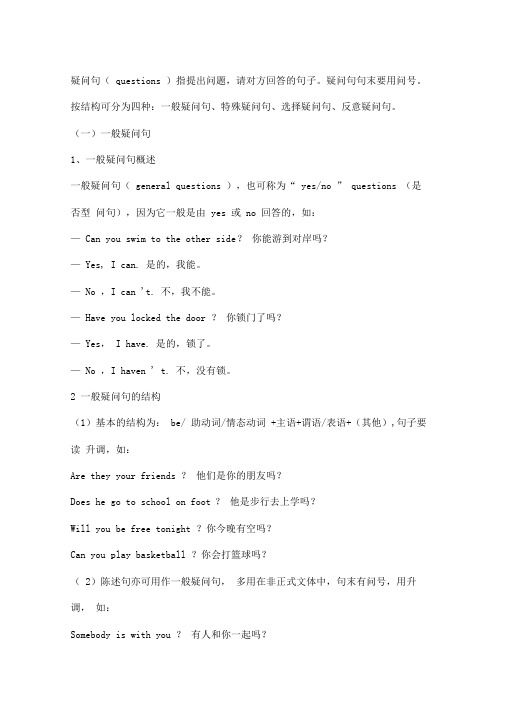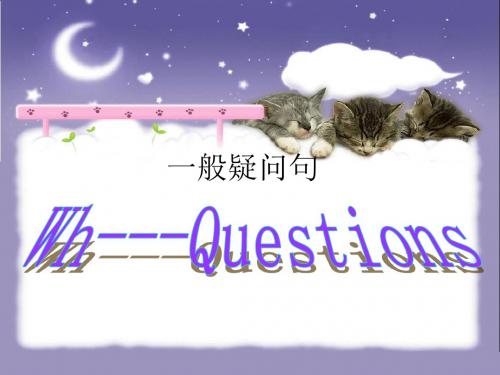七年级英语一般疑问句和特殊疑问句 ppt课件
初中英语一般疑问句和特殊疑问句

初中英语一般疑问句和特殊疑问句在英语学习中,一般疑问句和特殊疑问句是非常基础且重要的语法点,它们用于不同的交流情境中。
下面我会分别解释这两种句型的构成和使用方法,并提供一些例句。
一般疑问句一般疑问句用于询问事实或情况是否属实,通常期望对方用"Yes"或"No"来回答。
其构成是在陈述句的句首加上助动词、be动词或情态动词,并将句中的动词变回原形(如果有助动词或be动词,则保留原形)。
构成规则:1.如果句子中有be动词(am/is/are/was/were),则将be动词移到句首。
2.如果句子中有情态动词(can/could/may/might/will/would等),则将情态动词移到句首。
3.如果句子中没有上述两种动词,则根据时态选择相应的助动词do/does/did 放在句首。
例句:-陈述句:She is a student.-一般疑问句:Is she a student? (Yes, she is. / No, she isn't.)-陈述句:They can swim well.-一般疑问句:Can they swim well? (Yes, they can. / No, they can't.)-陈述句:You like coffee.-一般疑问句:Do you like coffee? (Yes, I do. / No, I don't.)特殊疑问句特殊疑问句用于询问具体的、特定的信息,句首使用特殊疑问词(what, who, where, when, why, how等)。
特殊疑问句的构成是特殊疑问词+一般疑问句的语序。
构成规则:1.特殊疑问词放在句首。
2.根据需要选择适当的助动词、be动词或情态动词,并调整语序,使其符合疑问句的结构。
例句:-Who is your favorite singer?-Where do you live?-When did you start learning English?-Why are you late today?-How do you usually go to school?通过掌握这些基本规则和例句,你可以更有效地在日常对话中使用一般疑问句和特殊疑问句。
英语问句课件PPT

用词不当
总结词
用词不当是指句子中使用了不恰当的词汇, 导致语义不明确或语法错误。
详细描述
用词不当可能是由于对词汇含义理解不准确 或拼写错误造成的。例如,“I have a good imagination.”(我有一个很好的想 象力。)中,“good”应该替换为 “great”,因为“great”更能准确地表达 “很好的”含义。正确的表达应该是“I have a great imagination.”(我有一个很 好的想象力。)
英语问句课件
contents
目录
• 英语问句的种类 • 英语问句的构成要素 • 英语问句的语气和语调 • 英语问句的回答方式 • 英语问句的常见错误和纠正方法
01
英语问句的种类
一般疑问句
总结词
以Yes或No回答的疑问句
详细描述
一般疑问句通常以be动词、助动词或情态动词开头,询问事实或观点,要求对 方给予肯定或否定的回答。例如:“Is the Earth round?”(地球是圆的吗? )
ห้องสมุดไป่ตู้调语气
总结词
用于强调某个信息或观点
详细描述
强调语气通常使用降调,并在需要强调的词语或短语上加重语气。这种语气可以突出某个信息的重要性,引起听 者的注意。
委婉语气
总结词
用于表达柔和、礼貌或含蓄的询 问或请求
详细描述
委婉语气通常使用升调,语气较 为柔和,常用于请求或询问时, 以避免直接或强硬的表达。
谓语的位置通常紧跟在主语之 后,但也可以出现在其他位置 。
宾语
宾语是问句中的受事者,表示动 作或状态的对象。
宾语可以是名词、代词或名词短 语,如“What do you want?”中的“you”。
小学英语语法---一般疑问句和特殊疑问句ppt课件

可编辑课件
4
e.g
This is Amy's bike.(一般疑问句)
Is this Amy's bike?
Yes, this is. (肯定回答)错误
No, this isn‘t. (否定回答)错误
Did you go to Beijing last weekend?
Yes, I did. (肯定回答)
2、如句子里是动词就在这些词前加 don't,doesn't,didn't
(1)主语是第一、二人称(复数)加don’t,第三人称单数加
doesn't
(2)如果是过去式就加didn't
例:I like dogs.
She likes swimming.
I don‘t like dogs.
She doesn’t like swimming.
No, I didn't. (否定回答)
I have some books. (一般疑问句)
Do you have any b可o编辑o课件ks?
5
变否定句的做法:
1、如句子里是be动词:am,is,are,was,were 就在这些词后加 not
例: He is Tom.
He is not Tom.
( B) 25. ______ tea did you have?
Two cups. • How many B. How much C. How soon D. Which
可编辑课件
15
感谢亲观看此幻灯片,此课件部分内容来源于网络, 如有侵权请及时联系我们删除,谢谢配合!
感 谢 阅
读感
谢
初中英语-疑问句(一般疑问句、特殊疑问句) PPT课件 图文

• 2.Chinese New Year this year is in February. When is Chinese New Year?
• 3.Kitty is wearing a special costume. Who is wearing a special costume?
which----Thing or person (对特定的人或事物提问)。
e.g “Which man is your English teacher?” “哪位是你的英 语老师?” “The man in white.” “那个穿着白衣服的。”
who----Person (对人提问)
e.g “Who will visit you tomorrow?” “My father.” “明天谁来看你?” “我爸爸。”
1.She is a pupil. Is she a pupil?
2. 她 是 学生。 是 她 学生 ?
2. I can see a star. Can you see a star?
3. My mother is a teacher.
Is your mother a teacher? 4. It will rain this afternoon.
flowers for your teachers?
Susan: No, I didn’t buy __a_n_y_ flowers, but I bought _so__m_e__ cards. Look!
Tom: Wow, how beautiful they are. Where did you buy them?
英语一般疑问句和特殊疑问句知识精讲

英语一般疑问句和特殊疑问句知识精讲疑问句可再分为一般疑问(General question)和特殊疑问(Special question)两种。
1.一般疑问:用be或助动词或情态动词置于句首,并以“Yes,…”,或“No,…”或相当于yes / no回答的问句称为一般疑问句.????2.?含系动词be的一般疑问句的构成具体地说,am 只能跟在第一人称的单数 I 后面,are 搭配 you, 不管是单数还是复数,is 跟在第三人称单数 he, she 后面,be 动词的基本意思:是如:I'm in Class 2, Grade 1.?→Are you in Class 2, Grade 1??你是在一年级二班吗?(如遇第一人称,最好将其置换成第二人称)It's a map of?China.?→Is it a map of China??这是一幅中国地图吗?????be?或?have(有)置于句首来表达疑问,例:Am I wrong again? (我又错了?)Yes, you are (wrong again). (是的,你又错了。
)No, you aren’t. (不,你没错。
)Is it your bicycle? (这辆自行车是你的吗?)Yes, it is.?(是的,是我的。
)No, it isn’t.?(不,那不是我的。
)Were there many people at her birthday party?(她的生日宴会来了很多人吗?)Yes, there were. (是的,来了很多人。
)No, there weren’t. (没有,没有很多人。
)Have you money with you??(你身上带钱了吗?)(=Do you have money with you?—美语)Yes, I have.(Yes, I do.—美语)(有,我带钱了。
)No, I have no money with me. (No, I don’t.—美语)(没有,我没带钱。
一般疑问句、特殊疑问句、选择疑问句、反义疑问句地详细用法

疑问句( questions )指提出问题,请对方回答的句子。
疑问句句末要用问号。
按结构可分为四种:一般疑问句、特殊疑问句、选择疑问句、反意疑问句。
(一)一般疑问句1、一般疑问句概述一般疑问句( general questions ),也可称为“ yes/no ” questions (是否型问句),因为它一般是由 yes 或 no 回答的,如:— Can you swim to the other side ?你能游到对岸吗?— Yes, I can. 是的,我能。
— No ,I can 't. 不,我不能。
— Have you locked the door ?你锁门了吗?— Yes, I have. 是的,锁了。
— No ,I haven ' t. 不,没有锁。
2 一般疑问句的结构(1)基本的结构为: be/ 助动词/情态动词 +主语+谓语/表语+(其他),句子要读升调,如:Are they your friends ?他们是你的朋友吗?Does he go to school on foot ?他是步行去上学吗?Will you be free tonight ?你今晚有空吗?Can you play basketball ?你会打篮球吗?( 2)陈述句亦可用作一般疑问句,多用在非正式文体中,句末有问号,用升调,如:Somebody is with you ?有人和你一起吗?He didn ' t finish the work ?他没有做完活吗?You are fresh from America , I suppose ?我猜,你刚从美国回来吧?3、一般疑问句的答语( 1)一般疑问句一般由 yes 或 no 来回答,如:— Are you tired ?你累了吗?— Yes,I am. 是的 ,累了。
— No, I ' m not. 不,不累。
— Does she do the cleaning ?她扫除了吗?— Yes , she does. 是的,她打扫了。
一般疑问句与特殊疑问句教学ppt课件

什么是特殊疑问句?
Studying aims:
1.能够准确说出 特殊疑问词的中文
意思。
2.能够根据语境,选择恰当的特殊 疑问词。
特殊疑问句 = 特殊疑问词 + 一般疑问句
特殊疑问句
1. 含义:特殊疑问句是指以 Wh- (How) 等特殊疑问词开头,对陈述句中某一 部分提问的句子。回答时不用Yes/No, 而是用一个句子或短语回答。
2.Whose bike is yellow? 谁的自行车是黄色的? ※ 一般后面跟名词。
Why,为什么
问原因
1.Why do you like spring? 你为什么喜欢春天? Because I can fly kites in spring. 因为在春天我可以放风筝。
2.Why do you go to school by bus?为什么你坐公共汽 车来学校?
Who,谁
问人是谁
1.Who is that boy? 那个男孩是谁?
2. Who are you going to with? 你打算和谁一起去?
3. Who is that beautiful girl? 那个漂亮的女孩是谁?
Whose,谁的
问东西是谁的
1.Whose bag is this? 这是谁的包?
一般疑问句
一般疑问句
• 主要由be动词、情态动词或助动词来开头。
(1) Is Han Mei in Class Four? (2) Can you spell your name, please? (3) Does he go to school every day?
be动词: am, is, are, was, were 情态v: can, could,may, might, will, shall,would, must, need, should, … 助动词: do does did has/have(已经) some在否定句, 疑问句中 要变成 any
疑问句(25张PPT)初中英语专项复习课件

● (一)反义疑问句的两种基本句型
形式
例句
肯定陈述句+否定附加问句
The girl went home late yesterday,didn’t she?这女孩昨天回家晚,不是吗?
否定陈述句+肯定附加问句
You haven’t been to Beijing,have you?你没 去过北京,是吗?
● B.how often
● C.how soon
● ( C )8.—Daddy,
will you buy me a bendable phone (折叠手机)?
● —Oh,perhaps in a few months.
● A.how long
● B.how far
● C.how soon
● D.how often
● B.No,it isn’t
● C.No,they aren’t
● ( B )4.—Is the girl in red your friend?
●—
.She is learning Chinese now.
● A.Yes,it is
● B.Yes,she is
● C.Yes,she does
●
—I like coffee.我喜欢咖啡。
● 【典题链接】
● ( A )10.—Can you play volleyball or basketball?
●—
of them.I’m good at ball games.
● A.Both
● B.Either
● C.Neither
● D.None
● ( C )11.—When shall we go on a picnic,Saturday or Sunday?
初中语法英语专题复习 一般疑问句和特殊疑问句(优质课件)

4、The model plane is under the sofa.
Is the model plane under the sofa?
Where is the model plane? 5、Her favorite subject is history.
Is this an old jacket? What's this?
2、My schoolbag is black and white. Is your schoolbag black and white?
What color is your schoolbag? 3、She likes playing sports.
技巧1、主语为I/we,转化成一般疑问句时,I/We要变为you, my,our 变为your。
技巧2、句子中没有实义动词时,选Is/ Are,有实义动词时 选Can/Do/Does 技巧3、肯定回答:Yes, +主语(通常是代词主格)+v.
不能用缩写形式Yes,it’s(x); Yes,it is.(v) 否定回答:No, +主语(通常是代词主格)+ v not.(常缩写形式).但am与 not不缩写.如:— Are you a student
一般疑问句和特殊疑问
1.Is this your pencil ? --Yes, it is. / No, it isn’t.
2.Can y用ouYplEaySb或askNetbOal来l? --Yes, I c回an.答/ N的o,问I ca句n’t. 3.Do常you是lik一e p般layi疑ng 问spo句rts?。
wh-特殊疑问句课件2021-2022学年人教版英语七年级上册

知识梳理
This is a suit.
一般疑问句
Is this a suit?
特殊疑问句WhatFra bibliotekis this?
知识梳理
This is a pen.
一般疑问句
Is this a pen?
特殊疑问句
What is this?
知识梳理
动物, 物体提问用 what what + 一般疑问句? 遇见my变成your
2._____ are Jack and Tom? They are behind you.
vocabulary 3._____ do you go to school? I go to school from Monday to Friday.
4._____ has a beautiful flower? John has a beautiful flower. 5._____ are they? They are my parents.
课堂导入
与Monday有关的英语
Black Monday 放假后开学的第一天;复活节后的星期一;黑色星期一 Blue Monday 忧郁的星期一 Mad Monday 忙乱的星期一
课堂导入
原来还有这么多意思啊, 真是太有趣了……
知识梳理
词句篇 特殊疑问v句ocabulary
特殊疑问句 是什么???
一般疑问句
Do you meet cats?
特殊疑问句
What do you meet?
知识梳理
It is a ticket.
一般疑问句
Is it a ticket?
特殊疑问句
What is it?
知识梳理
初中英语语法——对划线部分提问 (共15张) PPT课件 图文

来 一找:对人进行提问用who
一
二代:用who代替划线部分
道
简
三移:把who放在句首
单 的! 四变:把she is 变为一般疑问句
再 来
TWhhisatistishwaitsdhaicstt?..ionary.
一找:对物体进行提问用what
一
二代:用what代替划线部分
道
简
三移:把what放在句首
11.He often watches TV on Sunday ev What does he often do on Sunday e
12.Mr Wu usually goes to work at 8:00 What time does Mr Wu usually go to
13.The teachers like playing volleyball a What do the teachers like doing at sc
做 道
WMhyatemleyphteolnepehnounme bneurmisbw7e4rh1ia-s8.t.65.
一找:对数字进行提问用what
题 二代:用what代替划线部分
试
试
三移:把what放在句首
吧 四变:把My telephone number is 变为一 般疑问句
!
再
SWhheoisshwmehyioss.ister. Who is she?
The boy is 10 years old. THhHoewobwooylodlidsitshhisetohtwbheoeboyobldiyos.y?. ?
再
来
一找:对年龄进行提问用How old
特殊疑问句(18张PPT)初中英语专项复习课件

特殊疑问句的答语
6. —Which bike do you like ? ( black ) —I like the black one. —The black one.
What did he buy yesterday? (疑问词+一般问句)
特殊疑词的用法
二、疑问副词 :when,where,why,how (1)when 什么时候、何时。在疑问句中主要时间状语,表语。
如: He will come back next week. (状语)
When will he come back ? (疑问词+一般问句) His birthday was October 1,1989. (表语)
特殊疑词的用法
一、疑问代词 :who,whom,whose,which,what (5)what 什么,通常指事物,也可询问人的职业或身份。在
疑问句中主要作主语,宾语,表语或定语。
如: He is a teacher. (表语)
What is he ? (疑问词+一般问句) A book is on the desk. (主语) What is on the desk?(语序不变) He bought a book yesterday. (宾语)
分 18. I can't go with you because I have to look after
进
my brother.
行 19. It will be snowy tomorrow.
提 20. The girls play basketball every day.
英语一般疑问句和特殊疑问句知识

疑问句可再分为一般疑问(General question)和特殊疑问(Special question)两种。
1.一般疑问:用be或助动词或情态动词置于句首,并以“Yes,…”,或“No,…”或相当于yes / no回答的问句称为一般疑问句.2.含系动词be的一般疑问句的构成具体地说,am 只能跟在第一人称的单数 I 后面,are 搭配 you, 不管是单数还是复数,is 跟在第三人称单数 he, she 后面,be 动词的基本意思:I'm in Class 2, Grade 1. →Are you in Class 2, Grade 1? 你是在一年级二班吗?(如遇第一人称,最好将其置换成第二人称)It's a map of China. →Is it a map of China? 这是一幅中国地图吗?be 或 have(有)置于句首来表达疑问,例:Am I wrong again? (我又错了?)Yes, you are (wrong again). (是的,你又错了。
)No, you aren’t. (不,你没错。
)Is it your bicycle? (这辆自行车是你的吗?)Yes, it is. (是的,是我的。
)No, it isn’t. (不,那不是我的。
)Were there many people at her birthday party? (她的生日宴会来了很多人吗?) Yes, there were. (是的,来了很多人。
)No, there weren’t. (没有,没有很多人。
)Have you money with you? (你身上带钱了吗?)(=Do you have money with you?—美语)Yes, I have.(Yes, I do.—美语)(有,我带钱了。
)No, I have no money with me. (No, I don’t.—美语)(没有,我没带钱。
初中英语 中考复习:特殊疑问句句型总结课件

2020年12月25日
December 25th, 2020
17
What句型
句型 What is the weather like in…? What do you think of…? What is the population of…? What is sb’s address? What is sb.? What do/does sb. do? What is sb’s job? What do/does sb. look like? What is sb. like? What’s the date today? What day is it today? What time is it?/ What’s the time?
22
对划线部分提问
23
对划线部分提问:三步走 一改:将原句改为一般疑问句。
She goes to school on foot every day. Does she go to school on foot every day?
24ቤተ መጻሕፍቲ ባይዱ
对划线部分提问:三步走 二定:根据划线部分确定特殊疑问词。
She goes to school on foot every day. Does she go to school on foot every day?
21
What/How about…?
1 询问他人/物相同的情况
How about you? What about you ?
2 向对方提出建议或请求(+doing)
How about playing games on weekend? What about playing games on weekend?
特殊疑问句(17张PPT)初中英语专项复习课件

10.
How
did Philip go to France? He went there by air.
二、单项选择
1.--
are you going? -- I’m going to the library.
A. Who B. Which C. What D. Where
2.
is a ticket for the film Harry Potter?-- About forty yuan.
4. Excuse me,
is the nearest bookshop?
--Go down the street and turn left at the second corner?
A. how
B. what C. where D. who
5.
tea did you have? --Two cups.
A. How long B. How often C. How soon D. How wide
常考题型
He cleaned the bedroom last night.(对划线部分提 问)
变:变一般疑问句 加:句首加特殊疑问词 去:去划线部分
常考题型
He cleaned the bedroom last night.(对划线部分提 问)
特殊疑问句
初中英语专项复习
神马是特殊疑问句?
do you get up? do you want to do? will you choose? is he late for school? did you go to school?
这是特殊疑问词
以特殊疑问词引导 不能用yes/no回答,问什么答什么
英语一般疑问句的知识[优质ppt]
![英语一般疑问句的知识[优质ppt]](https://img.taocdn.com/s3/m/2139a9b2aeaad1f347933f42.png)
→ Are
Eg7. We can speak English fluently. → Can you speak English fluently?
2、第二家族:含行为动词(或称为实义动词)的句子 秘诀:一加二改三问号
六、“some”还是“any”?
在一般疑问句中,要表达“一些”时 , 一般用any,但如果这个问句是用来 表达 “建议、请求、邀请”等交际功
能时 ,应该用some.
七、词语的释义
情态动词
情态动词(Modal verbs)本身有一定的词义, 表示语气的单词。但是不能独立作谓语,只能和 动词原形一起构成谓语。情态动词用在行为动词 前,表示说话人对这一动作或状态的看法或主观 设想。 情态动词虽然数量不多,但用途广泛, 主要有下列: can (could), may (might), must, need, ought to, dare (dared), shall (should), will (would) must not.情态动词无人称和数的变化, 情态动词后面跟的动词须用原形,否定式构成是 在情态动词后面加 "not"。个别情态动词有现在 式和过去式两种形式,过去式用来表达更加客气, 委婉的语气,时态性不强,可用于过去,现在或 将来。情态动词属非及物动词,故没有被动语态。
二、一般疑问句的结构
一般疑问句有两个家族。
第一家族为含be动词或情态动词的一般疑问 句,其结构为:
be + 主语 + 其它部分
情态动词 + 主语 + 动词原形 + 其它部分
肯定回答用“Yes,主语+be\情态动词.”,否 定回答用“No,主语+be\情态动词+not.”。be或 情态动词和not可用缩写形式,主要有isn’t, aren’t,wasn’t,weren’t,can’t,mustn’t, needn’t等。
七级英语一般疑问句和特殊疑问句(共71张PPT)

my改成your , I 改成
we 改成you, our your )句末用问号。 I get up at six thirty every day.
Are there any books on the desk?
改成
_______________________
Can he sing?
I get to the shopping centre by bus.
Does he go to school on Monday
?
2. He goes swimming on Friday.
Does he go swimming on Friday
?
3、I wash my face at 8 o‘ clock.
Do you wash your face at 8 o‘ clock
There are about nine hundred people at the concert.
有be动词(is are am were was)/情态动词(can,could, will, would, shall, should,must,may)的。
Can he sing?
Who is their teacher?
(改一般疑问句) 36.
◦ He is LiLie. It is a fine day today.
Be 动词提到句首,其他照抄,句尾加问号。 ______________________ (改为一般疑问句)
◦ Who is he ? 29.
(改为感叹句) 13.
◦ He is my brother. Su Yang is asking Ben some questions.
初一英语上学期语法一般疑问句及特殊疑问句ppt课件

• 3.如果句中含有实义动词have且表示“有” 时, 使用do
• 例:I have some friends in America.
• →Do you have any friends in
America?
精选课件ppt
6
• 四.一般疑问句的回答
• 一般疑问句往往采用简短回答,共由三部分(三 个单词)组成,对这三部分(三个单词)的确定可 以概括例下:
• Can Jenny speak French?
• 2、往往读升调;
• 3、译成汉语,都可以带上“吗”,例如上面三句
可分别译为:你父亲是老师吗?凯瑟琳喜欢动物 吗?詹妮会说法语吗?
精选课件ppt
2
• 二、例何将陈述句变成一般疑问句?
• 要将陈述句变成一般疑问句,可以遵循下列 步骤:
• 1.看句中有没有be动词(am、is、 are、 ) 助动词(do、does、have、 )或情态动词 (can、must、will、等),如果有,将其提到 句首,句末打上问号即可。
• 一.用what time, what color, what day, what填空。
• 1. A: ______ _______ is it? B: It is nine o’clock.
• 2. A: ______ _______ does your mother get
up?
B: My mother gets up at 6:30.
• 特殊疑问句有两种语序:
• 1.如疑问词作主语或主语的定语,即对主 语或主语的定语提问,其语序是陈述句的语 序:疑问词(+主语)+谓语动词+其他成 分?如:
• who is singing in the room﹖
初中英语一般疑问句和特殊疑问句ppt课件

How much 多少(不可数名词) How much is the book?
How old 多大(岁数) How old are you?
29
How tall 多高(人,树) How tall is that tree? How long 多少时间(多久) ;多长(长度) How long will you stay here? How long is the rope?
24
三、疑问副词的用法 句型:疑问副词+一般疑问句的语序+ 其他? 1.when引导的疑问句:询问时间 When were you born? (I was born) on June 5.
25
2.where引导的疑问句:询问地点、场所 Where do you live? (I live in)Beijing. Where are you going? I am going to Japan.
30
How often 多久(频率) How often do you visit here?
How soon 多快(时间) How soon will he be back?
How far 多远(距离) How far is it from A to B?
31
谢谢!
32
5
三、陈述句变一般疑问句的方法
1. 动词be的疑问式:动词be根据不同的时态和人 称可以有am, is, are, was, were等不同形式,可用作 系动词(表示“是”、“在”等)和助动词(用于 构成进行时态和被动语态等),但不管何种情况, 构成疑问式时,一律将动词be的适当形式置于句首, 即:
- 1、下载文档前请自行甄别文档内容的完整性,平台不提供额外的编辑、内容补充、找答案等附加服务。
- 2、"仅部分预览"的文档,不可在线预览部分如存在完整性等问题,可反馈申请退款(可完整预览的文档不适用该条件!)。
- 3、如文档侵犯您的权益,请联系客服反馈,我们会尽快为您处理(人工客服工作时间:9:00-18:30)。
七年级英语一般疑问句和特殊疑问句
1
观察一下,这些肯定句 变成否定句的规律是怎 么样的?
七年级英语一般疑问句和特殊疑问句
2
◦be动词
七年级英语一般疑问句和特殊疑问句
3
◦肯定句: ◦They are in the park. ◦否定句: ◦ They are not in the p要 在(can)后加not.
七年级英语一般疑问句和特殊疑问句
12
◦助动词
七年级英语一般疑问句和特殊疑问句
13
◦She has some pencils. ◦She has not some pencils.
七年级英语一般疑问句和特殊疑问句
14
◦We learn English at one.
七年级英语一般疑问句和特殊疑问句
23
实义动词 型
1. He goes to school on Monday.
Does he go to school on Monday
?
2. He goes swimming on Friday.
Does he go swimming on Friday
?
3、I wash my face at 8 o‘ clock. Do you wash your face at 8 o‘ clock ?
4、You get up at 7 o’clock.
Do you get up at 7 o’clock ?
七年级英语一般疑问句和特殊疑问句
24
some变any
1. There are some books on the desk.
◦1. 有be动词(is are am were was)/情态动词(can, could, will, would, shall, should,must,may)的。 在be动词/情态动词后后加not。(some改成any)
◦2. 无be动词/情态动词,一般现在时在动词前加don’t 第三人称单数前doesn't/一般过去式 didn’t’。
He·can sing.
Can he sing?
Yes. I can. No. I can’t.
Yes. he can. No. he can’t.
can 提前,其他照抄(I 变为you
my变为your,some变为any).
七年级英语一般疑问句和特殊疑问句
22
◦He likes the dogs. ◦Does he like the dogs?
◦3.加doesn't/ didn’t的句子注意,句子动词要变成原 型。
七年级英语一般疑问句和特殊疑问句
17
观察一下,这些肯定
句变成一般疑问句的 规律是怎么样的?
七年级英语一般疑问句和特殊疑问句
18
肯定句: ◦They are in the park. ◦一般疑问句: ◦ Are they in the park?
c. He likes apples . (变否定句)
He doesn’t like apples .
实义动词的否定句:若主语为第三人称单数,在实义动词前加上助动 词 ”doesn’t 实义动词要还原, 注意: “doesn’t” 是加上去的,不是原句 里面的。
七年级英语一般疑问句和特殊疑问句
16
◦一、 肯定句改否定句的方法——一步法
句中有be(am is are)动词, 变否定句时, 需要 在( be )后加not.
七年级英语一般疑问句和特殊疑问句
5
◦情态动词
七年级英语一般疑问句和特殊疑问句
6
◦He can play the guitar.
◦He can not play the guitar.
七年级英语一般疑问句和特殊疑问句
七年级英语一般疑问句和特殊疑问句
4
Be 型esentation
1. There is a big clock.
There is not a big clock.
2.This is my bag. This is not my bag.
3.I am a student I am not a student.
◦
七年级英语一般疑问句和特殊疑问句
19
Be 型esentation
1. There is a big clock. Is there a big clock ?
2.This is my bag. Is this your bag ?
3.I am a student Are you a student ?
七年级英语一般疑问句和特殊疑问句
10
◦He likes the dogs. ◦He doesn't like the dogs
七年级英语一般疑问句和特殊疑问句
11
Can 型
I can do it very well. I can not do it very well.
He·can sing.
He can not sing.
7
◦He could be here soon. ◦He could not be here soon.
七年级英语一般疑问句和特殊疑问句
8
◦She may lose her way.
◦She may not lose her way.
七年级英语一般疑问句和特殊疑问句
9
◦We must follow the traffic rules. ◦We can't follow the traffic rules.
1.Be 动词提到句首,其他照抄,句尾加问号。
2.I 变为you,my 变为your. some 变any.
七年级英语一般疑问句和特殊疑问句
20
◦He can play the guitar. ◦Can he play the guitar?
七年级英语一般疑问句和特殊疑问句
21
Can 型
I can do it very well. Can you do it very well?
◦We don’t learn English at one.
七年级英语一般疑问句和特殊疑问句
15
实义动词 型
a. She has a book .(变否定句)
She doesn't have a book.
b. Lucy has many books . (变否定句)
Lucy doesn't have many books .
